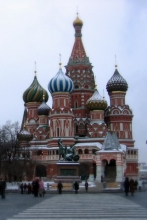PSI deeply concerned about Russia's situation in the World Trade Organisation

Public Services International, representing 650 affiliates in 150 countries, is deeply concerned about Russia’s situation, noting that our members around the world have long been experiencing the negative impacts of operating under the General Agreement on Trade in Services (GATS), a treaty of the World Trade Organization. The record shows in other countries that joining the WTO has hurt and narrowed access to public services, including through privatization, job losses, and deterioration of infrastructure and skills.
PSI affiliates worldwide are deeply concerned that the Russian people are deprived of their right to a referendum on accession to the WTO. Public Services International supports demands for a referendum on the WTO in Russia, and postponement of the ratification process.
Need for transparency
There are clear public demands for a thorough and transparent examination of the conditions and commitments signed by the WTO and the Russian government. PSI endorses the request for answers to the numerous questions raised by the people and workers of Russia regarding the potential for a Russia-WTO agreement to bring about the steady destruction of domestic industry, agriculture and services for the benefit of the few who open the doors to the Russian economy.
Neo-liberal pressure
The joint Working Group of the World Trade Organization and the Russian government proclaimed, in December 2011, that after 18 years of negotiations behind closed doors, Russia was fit for and should become a WTO member. Opponents of the agreement point out that this announcement is opportunistic in view of the world crisis and the global demand for Russia’s natural resources: much pressure comes from neo-liberal politicians for the Russian Parliament and the President to ratify and sign the WTO accession documents by 3 July 2012 at the latest.
No official translation
In February 2012, Russia’s Economy Ministry published some of the country’s pending WTO commitments. It is important to note, however, that to date there is no official translation into Russian of the 23,150 commitments and conditions of the entire protocol of about 2,000 pages. The sheer volume of material, should it be fully translated into Russian, would take an estimated two months for the members of Russia’s Duma merely to read through, let alone analyse; yet such review is essential in order for them to take responsibility for its adoption on behalf of the Russian people. Legal experts have already found grave mistakes and misleading passages in the informal abridged translation into Russian that appeared a short time ago.
Protests
Democracy in Russia is being severely tested. The people and workers in Russia are acting on their rights to protest. On 4 April 2012, the “Stop WTO” movement, in which public sector unions are active, sought to initiate a referendum on WTO. Holding a referendum was declared unlawful by the National Elections Committee based on the argument that it was not within the competence of the people to decide on such matters of international law and that this should strictly be addressed by the legislature; further, that the people would not understand the substance of a poll, as the documents to be ratified by the Duma were signed by the Russian government in their English language version. These are vacuous arguments that flout democracy and deride the representatives of the people. An appeal to the Supreme Court is scheduled to be heard on 6 June.
Anti-WTO protest actions are taking place and publications on the issue may be found in the media and on dedicated websites www.stop-vto.ru and www.wto-inform.ru
Video - http://stop-vto.ru/2012/05/26/mezhdunarodnaya-konferentsiya-31-maya/
Brochure in Russian - http://stop-vto.ru/wp-content/uploads/docs/stop-vto.pdf

